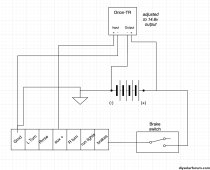Coming back to this discussion after installing the Orion TR 12/12 -9 (isolated) into the trailer with some questions for the electrical gurus here. I'm getting an unexpected result that I am not able to figure out: (note this is not the "smart" version - the only thing adjustable is the output voltage via a trimming pot)
1. Input side is connected to trailer plug (+) terminal (rated at 15 amps from Jeep).
2. Output side is connected to LifePO4 battery in trailer
3. Output voltage adjusted to 14.6v per recommendation from battery mfg. measured before being connected to trailer battery
Resting voltage on trailer battery is 13.3v
Output from Jeep while running is around 14.1v (measured both at the trailer connection and the input side of the Orion)
Problem: I'm only getting 13.3v at the battery while the tow vehicle is running, despite the Orion's output being connected to the battery (which is 14.6v when not connected to the battery). I've also checked the BMS and verified that there is no current inflow to the battery (no charging effect).
Somehow I'm getting no contribution from the Orion, despite it seeming to perform as expected when not connected to the battery.
For those that are going to say "you should have gotten the Smart version - thats a "real" DC-DC charger", yes, I know that would have been ideal, but (1) it would not have fit the space (2) I was trying to KISS and (3) trying to keep costs down and the extra $100 is not something I wanted to spend, as I really only intended this as a "trickle charger" type solution while underway (read my original post at the beginning of the thread). I have friends successfully using this approach, so I can't understand why my setup isn't working.
Thanks in advance for any advice.




